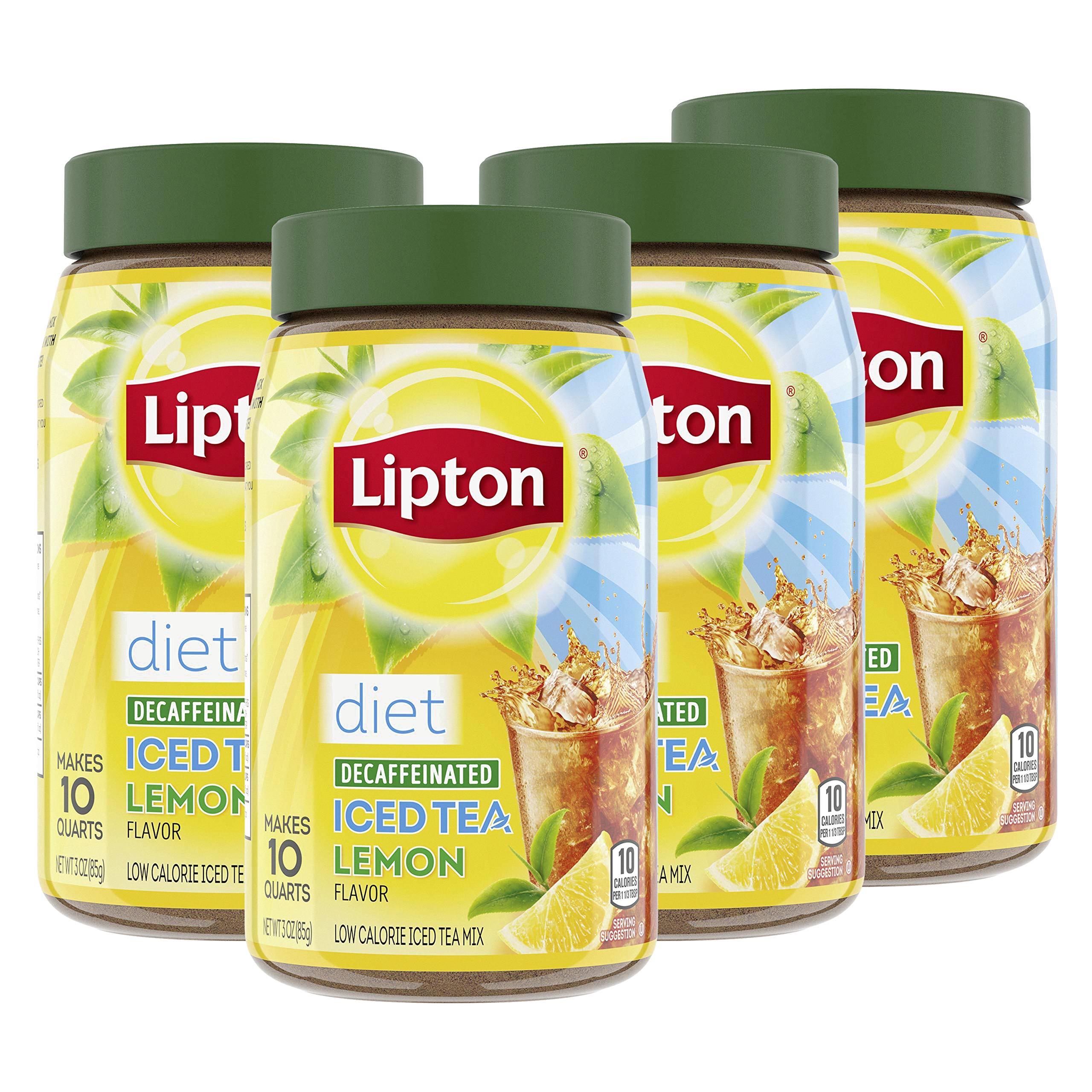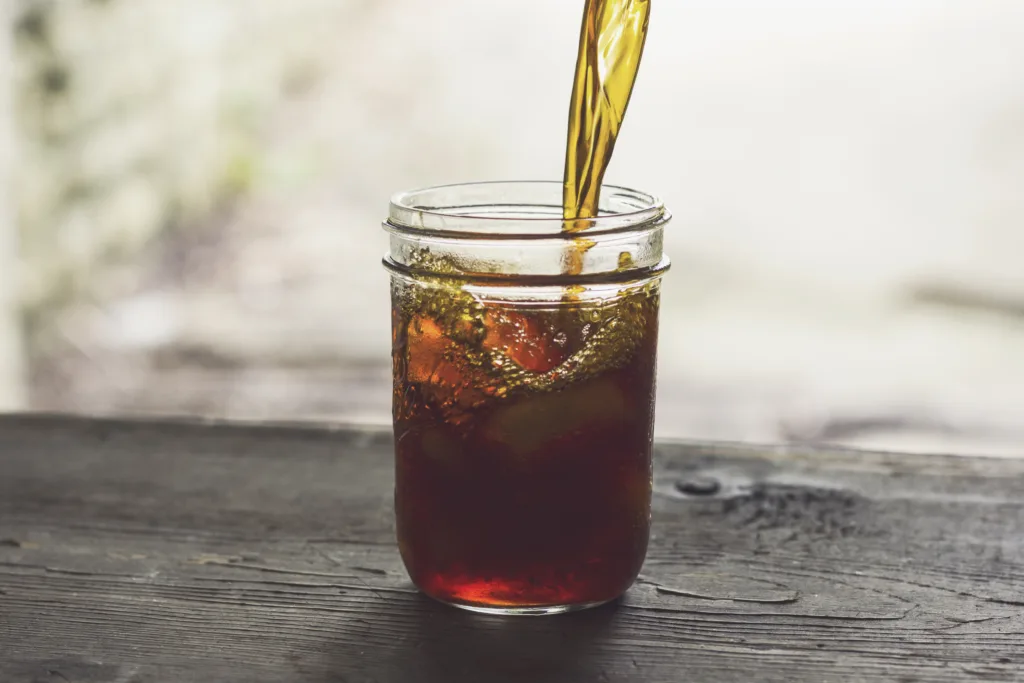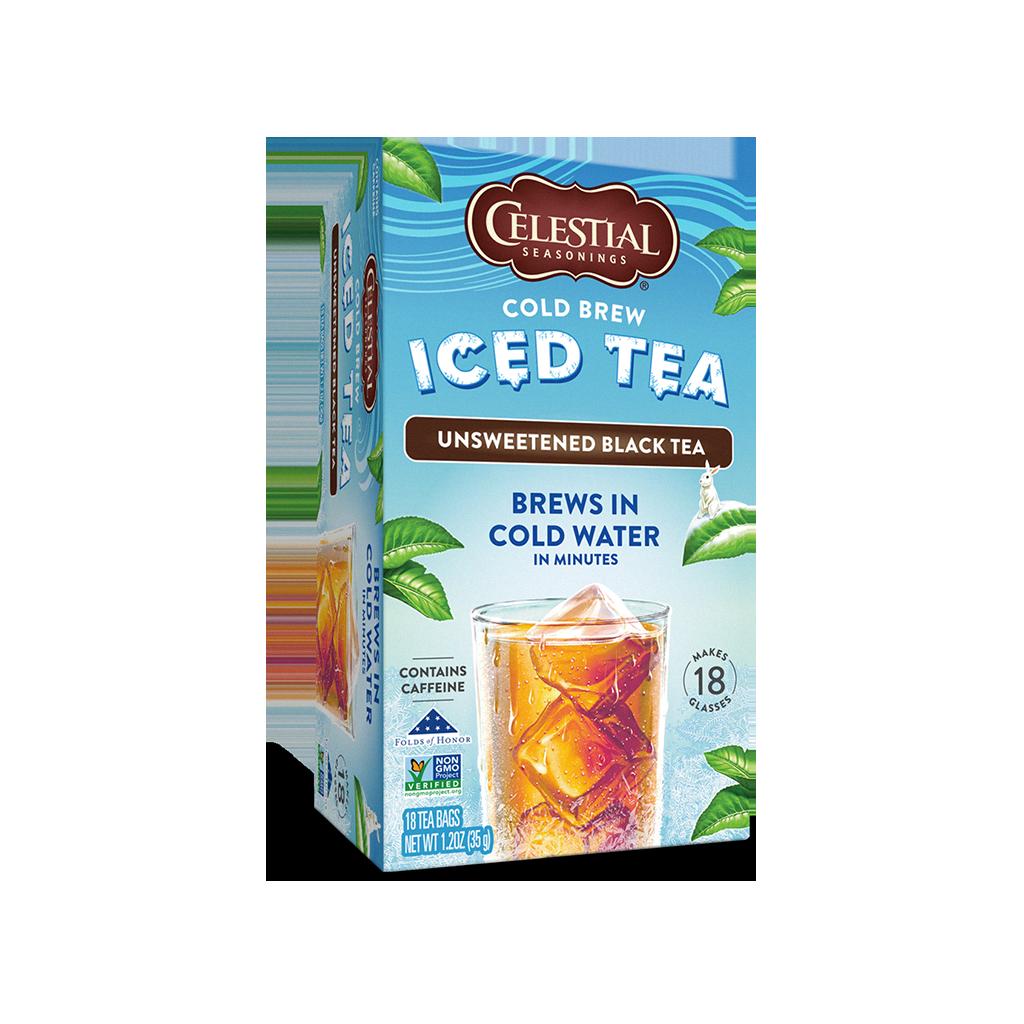Iced tea is a refreshing and delicious beverage that is enjoyed by millions of people around the world. It is a perfect drink for hot summer days or any time you need a caffeine boost. One of the most common questions people ask about iced tea is whether it contains caffeine. In this blog post, we will explore the answer to this question and provide you with all the information you need to know about iced tea and caffeine.
Firstly, it is important to note that not all teas contain caffeine. Herbal teas, such as chamomile or peppermint, are naturally caffeine-free. However, if you are drinking iced tea that is made from black, white, or green tea, it will contain caffeine. The amount of caffeine in iced tea can vary depending on the type of tea used and how it is brewed.
As a general rule, coffee contains about twice as much caffeine as tea. An average 16 oz serving of iced tea contains around 40 to 50 milligrams of caffeine. This is significantly less than the amount of caffeine found in a cup of coffee, which can range from 95 to 200 milligrams per cup. However, it is important to remember that individual caffeine tolerance levels can vary greatly, and some people may be more sensitive to caffeine than others.
While most iced teas do contain caffeine, there are some exceptions. For example, if you are drinking a herbal iced tea, such as peppermint or chamomile, it will not contain any caffeine. Also, some manufacturers make decaffeinated iced tea, which has had the caffeine removed. So, if you are looing for an iced tea that does not contain caffeine, these are great options to consider.
It is also important to note that some teas contain additional stimulants, such as guarana, which can increase the caffeine levels in the tea. Guarana is a plant that is native to the Amazon basin and is known for its high caffeine content. If you are looking to avoid stimulants, it is best to check the ingredients of your tea before consuming it.
Iced tea does contain caffeine, but the amount can vary depending on the type of tea used and how it is brewed. If you are sensitive to caffeine or looking to avoid it altogether, herbal iced teas or decaffeinated iced teas are great options to consider. However, if you are looking for a refreshing drink that can provide a caffeine boost, iced tea is a great choice. So, grab a glass of iced tea, sit back, and enjoy the delicious taste and energy-boosting benefits.
The Caffeine Content of Iced Tea
Iced tea does contain a moderate amount of caffeine. On average, a 16 oz serving of iced tea contains around 40 to 50 milligrams of caffeine. This amount can vary depending on the type of tea used, the brewing time, and the serving size. For comparison, a 12 oz can of soda typically contains around 30 to 40 milligrams of caffeine, and a 8 oz cup of coffee contains around 95 milligrams of caffeine. Therefore, while iced tea may not have as much caffeine as coffee, it still contains a considerable amount and should be consumed in moderation, especially for those who are sensitive to caffeine.

Source: amazon.com
Comparing Caffeine Levels in Iced Tea and Coffee
As a general rule, coffee contains about twice as much caffeine as tea. However, the exact amount of caffeine in both beverages can vary significantly. Factors that can affect caffeine levels in coffee include the type of bean, roast level, brewing method, and serving size. For tea, the caffeine content can vary depending on the type of tea leaves used, how long it is steeped, and whether it is brewed hot or cold.
When comparing iced tea and coffee, it’s important to note that iced tea often contains less caffeine than its hot counterpart, as it is typically brewed with less tea leaves and then diluted with ice and water. On the other hand, iced coffee may contain more caffeine than hot coffee, as it is often brewed stronger and then served over ice.
Ultimately, the caffeine content of iced tea and coffee can vary widely depending on a number of factors. It’s alays a good idea to check the label or ask your barista or server if you’re curious about how much caffeine a particular beverage contains.
The Effects of Iced Tea on Sleep
Iced tea, like any other tea, can keep you awake if it cntains caffeine. Caffeine is a stimulant that can increase alertness and decrease drowsiness. However, not all iced teas contain caffeine. Herbal teas, such as chamomile or peppermint, are naturally caffeine-free and can help promote relaxation and sleep. On the other hand, black, green, and white teas contain caffeine and can interfere with sleep if consumed before bedtime. It is important to read the label or check with the manufacturer to determine whether an iced tea contains caffeine. Additionally, it is recommended to limit caffeine consumption, especially in the afternoon and evening, to avoid sleep disturbances.
Does Lipton Iced Tea Contain Caffeine?
Lipton Iced Tea contains caffeine. In fact, each serving of Lipton black tea bags, which can be used to make iced tea, contains 55 mg of caffeine. This amount of caffeine is similar to other black teas on the market and can provide a boost of energy to help you power through your day. However, it’s important to note that the caffeine content may vary depending on how long you steep the tea bags and how much tea you use. It’s always a good idea to read the label and be mindful of your caffeine intake.
How Long Does Caffeine From Iced Tea Remain in the Body?
Caffeine is a stimulant that can help you stay alert and focused. If you consume caffeine from iced tea, you may wonder how long it will stay in your system. According to the FDA, the half-life of caffeine, which is the time it takes for your body to eliminate half of the caffeine, is around four to six hours. This means that up to six hours afer drinking iced tea, half of the caffeine you consumed is still present in your body. However, the actual amount of time caffeine stays in your system can vary depending on factors such as your age, weight, metabolism, and liver function. Additionally, the amount of caffeine in iced tea can vary depending on the type of tea and how it was prepared. It’s important to note that consuming caffeine too close to bedtime can interfere with sleep, so it’s recommended to avoid caffeine later in the day if you have trouble falling asleep.

Types of Iced Tea Without Caffeine
If you’re looking for an iced tea that doesn’t contain caffeine, you might want to try out the Pureleaf Caffeine-Free Herbal Iced Tea. This particular iced tea is made from carefully selected dried hibiscus or chamomile petals that are expertly blended to create a delicious and refreshing beverage. Unlike traditional tea, which is made from the leaves of the Camellia sinensis plant and contains caffeine, this herbal iced tea is completely caffeine-free. This means that you can enjoy it at any time of the day withot worrying about the stimulating effects of caffeine. Additionally, the tea is infused with natural fruit flavors, which add a delightful sweetness and aroma to the drink. So if you’re in the mood for a soothing and delicious iced tea that won’t keep you up at night, you should definitely give Pureleaf Caffeine-Free Herbal Iced Tea a try.
Comparing Caffeine Levels in Coke and Iced Tea
When it comes to comparing the caffeine content of Coke and iced tea, it is important to note that the caffeine content can vary greatly depending on the brand and type of beverage. However, as a general rule, Coke tends to have more caffeine than iced tea. A 12-ounce can of Coke contins around 34 milligrams of caffeine, while an 8-ounce cup of iced tea typically contains around 20-30 milligrams of caffeine. It is worth noting that some brands of iced tea may have higher caffeine levels, especially if they are marketed as “energy” or “boost” drinks. Additionally, the brewing method and steeping time can also affect the caffeine content of iced tea. if you are looking to limit your caffeine intake, it may be best to opt for a non-caffeinated soda or a caffeine-free iced tea.
Which Tea Has the Highest Caffeine Content?
When it cmes to caffeine content, black and pu-erh teas are typically the highest, with an average of 40-60 milligrams per 8-ounce cup. Oolong teas contain slightly less caffeine, with an average of 30-50 milligrams per 8-ounce cup. Green teas are next on the list, with an average of 20-45 milligrams per 8-ounce cup, while white teas contain even less caffeine, with an average of 15-30 milligrams per 8-ounce cup. purple teas have the lowest amount of caffeine, with an average of 10-20 milligrams per 8-ounce cup. It’s important to note that caffeine content can vary based on factors such as brewing time and temperature, tea quality, and even the age of the tea leaves.
Comparing Caffeine Levels in Tea and Coke
When it comes to caffeine content, it is important to keep in mind that different beverages contain varying amounts of caffeine. In general, Coke and Diet Coke are lower in caffeine compared to oter caffeinated beverages such as energy drinks, coffee, and tea. In terms of comparing tea and Coke, it depends on the specific type of tea and serving size. For example, a green tea typically contains around 35 mg of caffeine per 8-ounce serving, while a 7.5-ounce serving of Coke contains about 21 mg of caffeine, and a 7.5-ounce serving of Diet Coke contains around 28 mg of caffeine. Therefore, in terms of caffeine content, green tea typically contains more caffeine than Coke or Diet Coke. However, it is important to note that caffeine content can vary depending on factors such as brewing time and method, as well as the specific brand or type of beverage.

Source: celestialseasonings.com
The Effects of Drinking Iced Tea Before Bed
While iced tea can be a refreshing beverage during a hot summer day, it may not be the best choice to consume before bed. This is because iced tea, like any other tea, contains caffeine, which can stimulate your nervous system and keep you awake. Even decaffeinated iced tea can still contain a small amount of caffeine, so it’s important to check the label before consuming it before bed.
Another factor to consider is the sugar content in the iced tea. Many iced tea brands contain added sugars, which can lead to a spike in blood sugar levels and disrupt sleep. It’s best to choose unsweetened or lightly sweetened iced tea options if you’re looking to consume it before bed.
If you’re looking for a bedtime beverage, herbal teas like chamomile or lavender can be a great choice. These teas are naturally caffeine-free and have calming properties that can help promote relaxation and sleep. while iced tea can be a refreshing beverage, it’s best to avoid consuming it before bed to ensure a good night’s sleep.
Drinking Iced Tea at Night: Is It Safe?
Certainly, you can enjoy a refreshing glass of iced tea at night. However, it is important to consider the caffeine content of the tea you are drinking. If the iced tea is made from a traditional black tea, it will likely contain caffeine which can disrupt your sleep. On the other hand, if you opt for a decaffeinated or herbal tea, you can enjoy the beverage without worrying about the potential sleep disturbances. Additionally, some herbal teas, such as chamomile, may actully promote relaxation and better sleep. Ultimately, the decision to drink iced tea at night comes down to personal preference and sensitivity to caffeine. So, feel free to indulge in a cool and refreshing glass of iced tea as long as you choose a caffeine-free variety or are comfortable with the potential effects of caffeine on your sleep.
The Effects of Drinking Iced Tea All Day
Drinking iced tea all day may not be the best idea for everyone. While moderate intake of tea is generally considered healthy, excessive consumption of iced tea may lead to negative side effects. Some of the potential side effects include anxiety, headaches, digestive issues, and disrupted sleep patterns. These side effects may be more pronounced in individuals who are sensitive to caffeine or have pre-existing health conditions. It is generally recommended that individuals limit their tea intake to 3–4 cups (710–950 ml) per day to avoid negative side effects. Ultimately, the amount of iced tea one can drink per day varies based on individual factors such as age, health, and tolerance to caffeine. It is always best to consult with a healthcare professional to determine how much iced tea is appropriate for your individual needs.
The Effects of Drinking Too Much Iced Tea
If you drink too much iced tea, it can lead to a build-up of oxalic acid in your kidneys. Oxalic acid can interfere with the kidneys’ ability to remove waste from the blood, potentially leading to kidney stones or other kidney problems. Additionally, excessive consumption of iced tea can cause dehydration due to its diuretic properties, which can also put a strain on the kidneys. Therefore, it is recommended to consume iced tea in moderation to avoid any negative health consequences.

Comparing Caffeine Levels in Coffee and Lipton Tea
When it comes to caffeine content, coffee is known for being one of the most caffeinated beverages. According to the USDA, an average cup of coffee contains about 95mg of caffeine. On the other hand, Lipton tea, both green tea and matcha green tea variants, cntain a significantly lower amount of caffeine, with only 28-38mg of caffeine per 8 fl oz. serving. Even the strongest Lipton black tea, Extra Bold, contains around 38-45mg of caffeine per 8 fl oz. serving, which is still lower than coffee. Therefore, it is safe to say that coffee has more caffeine than Lipton tea.
Conclusion
Iced tea is a refreshing and delicious beverage enjoyed by many around the world. While it does contain caffeine, the levels are relatively low compared to coffee, and most varieties of tea do not contain caffeine at all. It is important to note that some teas, particularly those conaining guarana, can have a stimulating effect and should be avoided before bedtime. Lipton offers a great option for those looking to enjoy a cup of iced tea, with their black tea bags containing a moderate amount of caffeine per serving. So whether you prefer your tea hot or cold, iced tea is a great choice for a flavorful and refreshing beverage.
